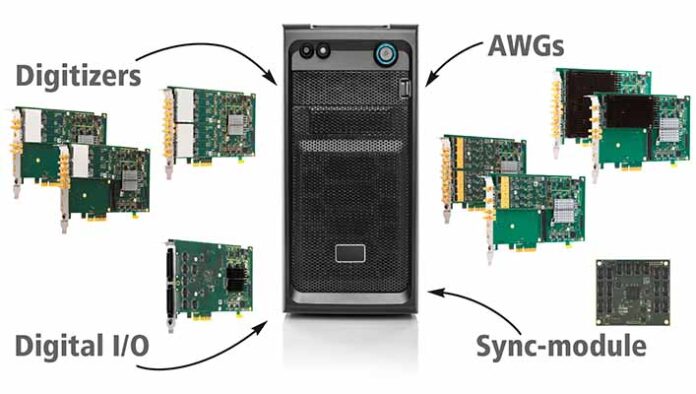Bangalore – The recent addition of a Digital I/O card means that Spectrum Instrumentation has now completed its M2p family of PCIe-cards. Together with the comprehensive, matching set of digitizers and Arbitrary Waveform Generators (AWGs), customers can now create economical, multi-channel, Test & Measurement systems to precisely meet their needs for signal acquisition and waveform generation in the speed range of up to 125 MSamples per second. The M2p cards are all half-length PCIe-cards so that they can be inserted into almost any desktop PC to create a system that perfectly fits the specifications required.
The need for multi-channel testing has never been greater. Electronic components, devices and systems, continue to increase in complexity, often using array and parallelization techniques to increase their performance. In turn, their testing requires more measurements to be made simultaneously and at higher speeds. The M2p series offers a convenient solution, allowing the creation of customized test systems with tens, or even hundreds, of analog and digital channels.
Link to the video (6 min):
Digitizer, AWG and Digital I/O cards
The M2p series consists of 39 different products in three different instrumentation classes. There are 24 digitizers for analog signal acquisition, 14 AWGs for analog signal generation, and a Digital I/O card that can both acquire or generate high-speed digital signals. Being PCIe, the cards are lightning fast and can be installed in almost any desktop PC, or a PCIe expansion chassis, to access the latest state-of-the-art PC hardware and software.
To acquire or generate analog signals with outstanding accuracy and resolution, the digitizer and AWG cards all use cutting-edge 16-bit technology. Individual cards offer one, two, four or eight fully synchronized channels and are available with a choice of speed grades. The digitizers offer sampling rates that go up to 5, 20, 40, 80 or 125 MS/s, while the AWGs have maximum output rates of 40, 80 or 125 MS/s.
For applications that call for a high number of digital channels, such as logic analysis or pattern generation, the M2p family also has a dedicated card for the task. The model M2p.7515-x4 has 32 parallel channels and can be programmed to either acquire or generate digital signals at clocking rates anywhere from 1 kHz up to 125 MHz.
Common technology cuts costs and lets multiple cards work together

All the M2p products utilize a common platform board onto which various modules are mounted to create the 39 different models. Sharing base card technology allows all the classes of instrument to work well together, providing similar features and programming. Shared technology also lowers production costs and increases reliability.
Another advantage is that each product uses the same clock and trigger circuitry. This allows the cards to be connected by a clock and trigger distribution module called “Star-Hub” that provides complete system synchronization. The Star-Hub allows up to 16 cards to be connected and makes it easy to create systems with as many as 128 analog or 512 digital channels. The M2p series enables customers to mix and match almost any combination of digitizer, AWG and digital I/O cards to create their own, customized, multi-channel, test system.
For example, six M2p.5923-x4 digitizer cards could be used to build a system with 48 channels, each offering sampling rates up to 20 MS/s. This is a speed grade that is perfect for acquiring signals in the MHz frequency range and is well suited to applications such as ultrasonic imaging, mechanical measurements, LIDAR, fluid mechanics, seismic studies, and scientific experiments.
Adding AWG cards to a system is a simple way to build automated testing platforms for stimulus-response or closed-loop type measurements. The M2p series of AWGs can produce almost any waveshape with frequency content up to 60 MHz and up to ±12 V output swing. By connecting multiple AWGs together with Star-Hub, a signal source with up to 80 fully synchronized channels can be built in one PC. This is a cost-effective way for constructing the sophisticated systems that are needed to stimulate electronic devices in applications such as robotics, mechatronics, component verification, optical transceiver testing – or even as complete device simulators.
Mix, match and integrate with other instruments
The digitizers and AWGs feature front panel connectors for sharing and receiving information from other equipment. Connectors for external trigger and clock inputs are complimented by four, multi-functional connectors that can be individually programmed. These multi-function connectors can be used for synchronous digital I/O, asynchronous I/O lines and for logic trigger inputs. If more I/O capability is needed, there is also a piggy-back module available to add another 16 digital lines to each analog card.
Fully programmable, all the M2p cards come complete with drivers for Windows and Linux, as well as programming examples for C/C++, LabVIEW, MATLAB, Visual Basic .NET, Python, Julia, and other popular programming languages. Included with the products is the company’s industry-leading, 5-year warranty as well as free software and firmware updates for their whole lifetime. With over 30 years of knowledge in designing and building fast digitizers, AWGs and Digital I/O products, Spectrum Instrumentation is recognized internationally for its excellent quality.
More information about Spectrum can be found at www.spectrum-instrumentation.com













